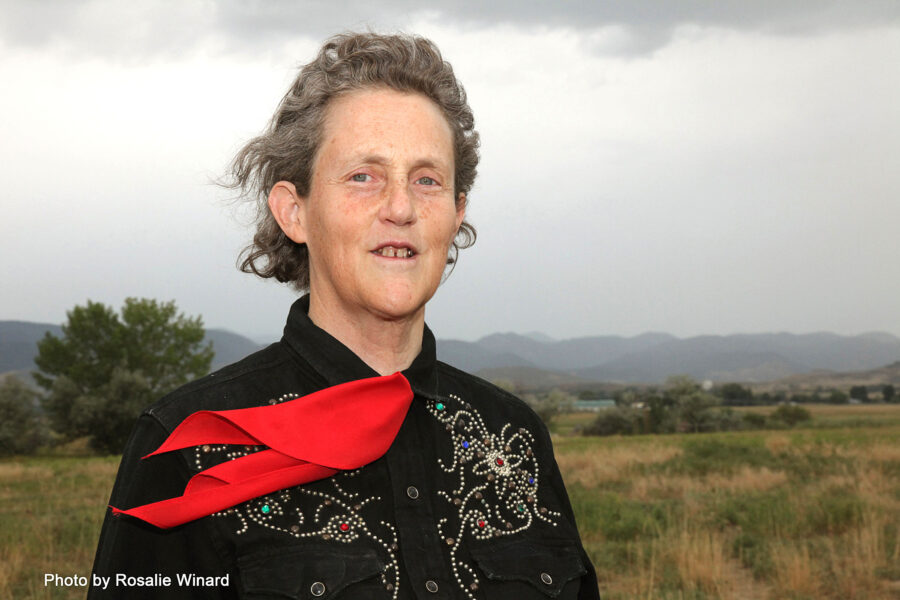Autism self-advocate Temple Grandin, PhD, will share her unique perspective on animals when she headlines the 2024 Nebraska Science Festival this spring.
A professor of animal science at Colorado State University, Dr. Grandin also is a pioneer in improving the handling and welfare of farm animals.
Dr. Grandin will kick off the festival March 26 with her presentation, “Animals Make Us Human,” the very title of her New York Times best seller. The 7:30 p.m. presentation will be at The Garden Theater, 3125 Oak View Drive in Omaha. Dr. Grandin’s talk will help attendees better understand animals in their sensory-based world as well as provide insights into solving problems. General admission tickets are free but required for admittance; tickets will be available March 1 via Eventbrite. The program is suggested for ages 12 and older.
“We are thrilled to bring Dr. Grandin to Omaha for the Nebraska Science Festival,” said SciFest coordinator Kacie Baum, senior manager for events and community engagement in UNMC’s Department of Strategic Communications. “She is a rock star in animal science and autism education and will inspire us with her extraordinary insights into how animals think, act and feel.”
The Nebraska Science Festival, which runs throughout April, features an array of science- and technology-related activities in communities across the state – all designed to make science accessible, interactive, relevant and fun for all ages.
Dr. Grandin’s achievements are remarkable because she was an autistic child. At age 2 she had no speech and signs of severe autism. She learned speech after many hours of therapy and intensive teaching. Later, inspired in part by her high school science teacher, she pursued a career as a scientist and livestock equipment designer. Half the cattle in the U.S. and Canada are handled in equipment she has designed for meat plants. She has developed animal welfare guidelines for the meat industry and consulted with companies on animal welfare. Widely published, she continues her research at Colorado State University and teaches courses on livestock handling and facility design.
In her latest book, Navigating Autism: 9 Mindsets For Helping Kids on the Spectrum, Dr. Grandin presents nine strengths-based mindsets necessary to successfully work with young people on the autism spectrum. Her book Animals in Translation was a New York Times best seller, and her book Livestock Handling and Transport is in its fourth edition. In addition to a popular TED Talk, she has authored Thinking in Pictures, Emergence Labeled Autistic, Animals Make us Human, Improving Animal Welfare: A Practical Approach, The Way I See It, and The Autistic Brain.
Past SciFest speakers have included scientist Bill Nye, “Animal Planet” host and conservationist Jeff Corwin, meteorologist and extreme storm chaser Reed Timmer; actor and storyteller LeVar Burton; Kari Bryon, host of Discovery Channel’s Mythbusters and The White Rabbit Project on Netflix; the late Grant Imahara with Mythbusters; and Jeopardy!” host Ken Jennings.
The Nebraska Science Festival – presented by the University of Nebraska Medical Center – is a collaboration of organizations and individuals interested in the advancement of science literacy. In addition to UNMC, other sponsors, to date, are Boys Town, Metro Credit Union, KETV and the National Science Foundation’s Presidential Awards for Excellence in Mathematics and Science Teaching.
In addition to NeSciFest.com, SciFest updates and information can be found on Twitter (@NESciFest) and Facebook (NE SciFest).
About UNMC
As Nebraska’s only public academic health science center, the University of Nebraska Medical Center enrolls more than 4,500 students across six colleges, two institutes and a graduate studies program. Its mission is to create a healthier future for Nebraskans through premier education, research and clinical care, but its impact — rooted in a culture of collaboration, big ideas and public-private partnerships – goes far beyond, in areas that include infectious diseases, rural health, cancer research and treatments, global health security, and simulation and experiential learning technologies.
